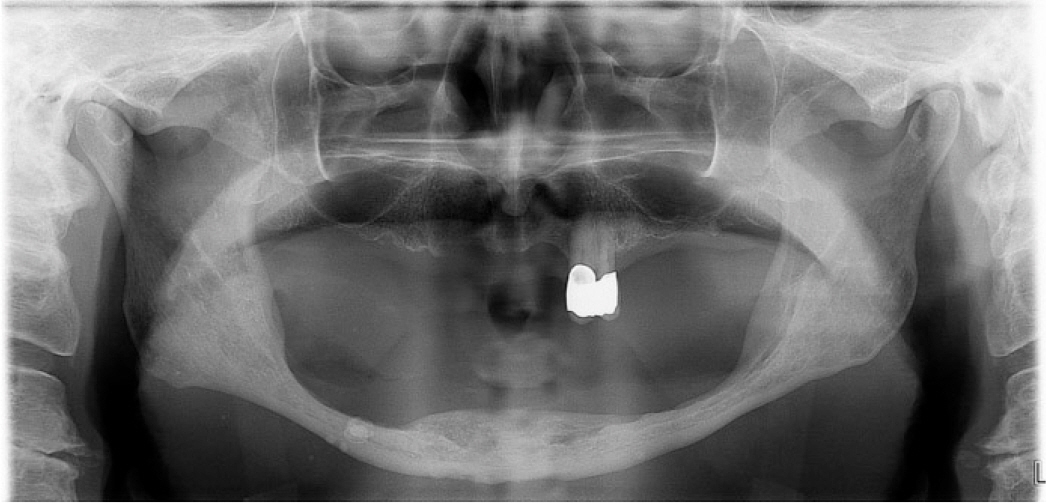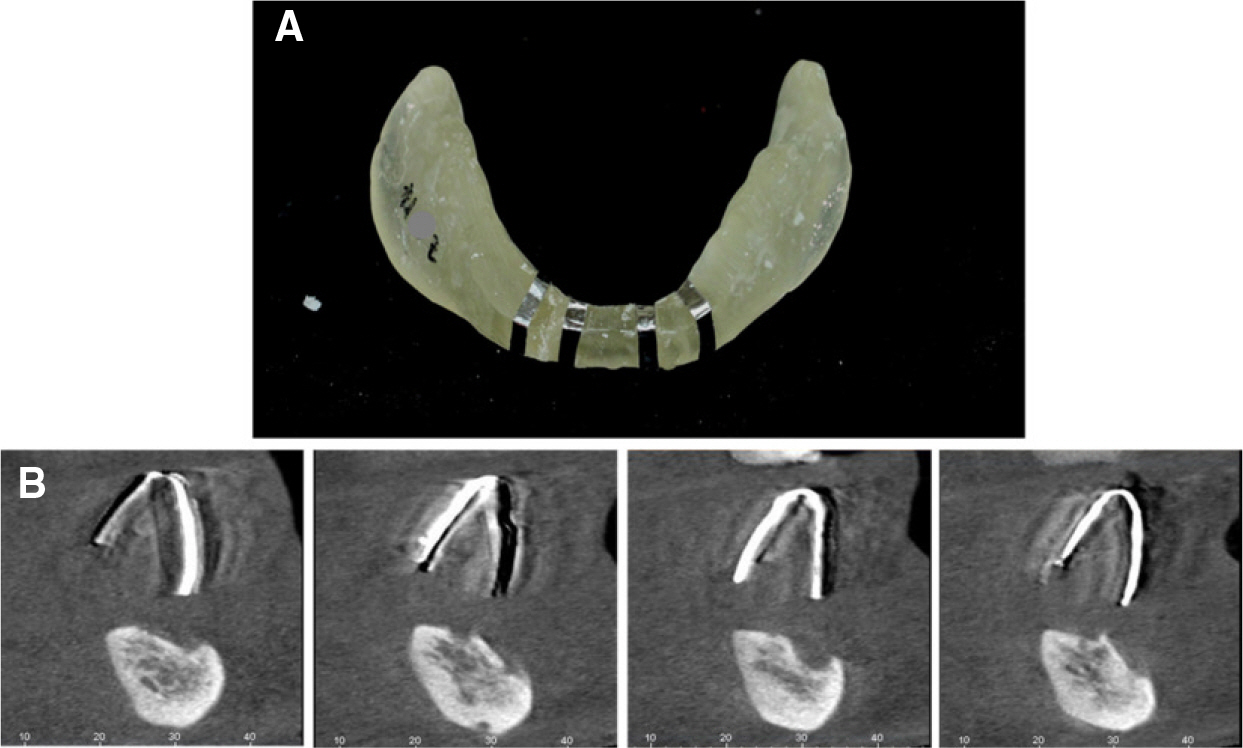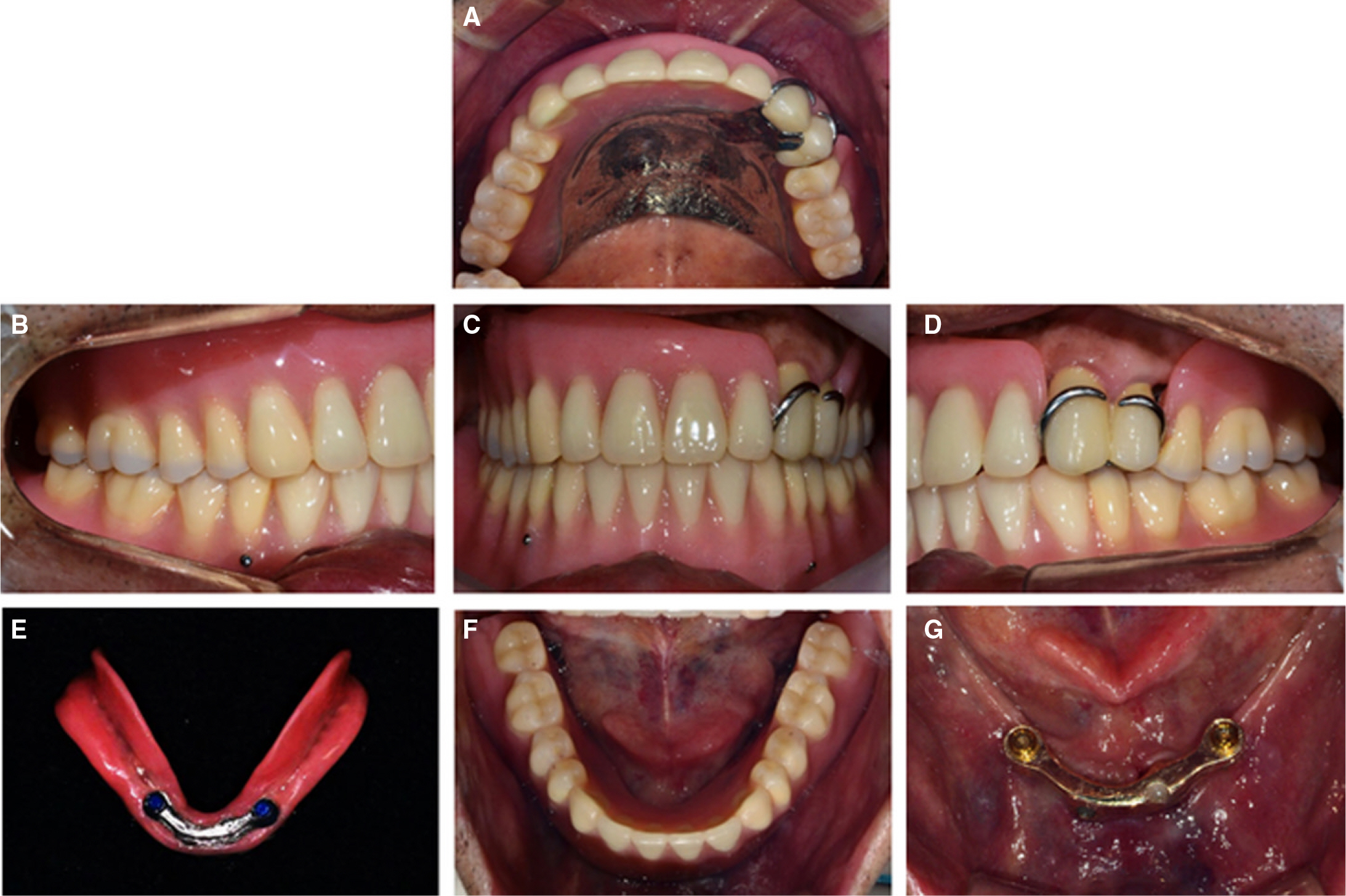J Korean Acad Prosthodont.
2016 Oct;54(4):401-406. 10.4047/jkap.2016.54.4.401.
Mandibular implant overdenture using milled bar attachment on implants with unfavorable fixture angulation: A case report
- Affiliations
-
- 1Department of Prosthodontics, School of Dentistry, Pusan National University, Yangsan, Republic of Korea. neoplasia96@hanmail.net
- KMID: 2388219
- DOI: http://doi.org/10.4047/jkap.2016.54.4.401
Abstract
- Implant overdenture exhibits higher retention, masticatory function, and patient's satisfaction compared to conventional dentures. Particularly, in treatment of severe alveolar bone resorption, implant overdenture can be considered as the first treatment option. The types of attachments used for implant overdenture can be classified into solitary type, which implants are not connected to each other, and bar type in which implants are connected. In the case of solitary type commonly used in clinical practice, parallel relationship is important. When it is not established, there is a higher risk of attachment wear, retention loss, and frequent visits for maintenance. In this case, satisfactory results have been obtained with implant overdentures using milled bar on two unparallel implants placed on the mandible.
Figure
Reference
-
1.van Waas MA. The influence of clinical variables on patients' satisfaction with complete dentures. J Prosthet Dent. 1990. 63:307–10.
Article2.Melas F., Marcenes W., Wright PS. Oral health impact on daily performance in patients with implant-stabilized overdentures and patients with conventional complete dentures. Int J Oral Maxillofac Implants. 2001. 16:700–12.3.Feine JS., Carlsson GE., Awad MA., Chehade A., Duncan WJ., Gizani S., Head T., Heydecke G., Lund JP., MacEntee M., Mericske-Stern R., Mojon P., Morais JA., Naert I., Payne AG., Penrod J., Stoker GT., Tawse-Smith A., Taylor TD., Thomason JM., Thomson WM., Wismeijer D. The McGill consensus statement on overdentures. Mandibular two-implant overdentures as first choice standard of care for edentulous patients. Gerodontology. 2002. 19:3–4.
Article4.Trakas T., Michalakis K., Kang K., Hirayama H. Attachment systems for implant retained overdentures: a literature review. Implant Dent. 2006. 15:24–34.
Article5.Mericske-Stern RD., Zarb GA. Clinical protocol for treatment with implant-supported overdentures. Bolender CE, Zarb GA, Carlsson GE, editors. Boucher's Prosthodontic Treatment for Edentulous Patients. St. Louis: Mosby;1997. p. 527.6.Misch CE. Dental implant prosthetics. St. Louis: Mosby;2005. p. 214–15.7.Han DH., Kim SK., Kim YH. Textbook of oral & maxillofacial implantology. vol. I basic principles and techniques. Daehan Publishing Co: Seoul;2004. p. 257–59.8.Chan MF., Närhi TO., de Baat C., Kalk W. Treatment of the atrophic edentulous maxilla with implant-supported overdentures: a review of the literature. Int J Prosthodont. 1998. 11:7–15.9.Jemt T., Book K., Lindén B., Urde G. Failures and complications in 92 consecutively inserted overdentures supported by Brånemark implants in severely resorbed edentulous maxillae: a study from prosthetic treatment to first annual check-up. Int J Oral Maxillofac Implants. 1992. 7:162–7.10.Stephens GJ., di Vitale N., O'Sullivan E., McDonald A. The influence of interimplant divergence on the retention characteristics of locator attachments, a laboratory study. J Prosthodont. 2014. 23:467–75.
Article11.Gulizio MP., Agar JR., Kelly JR., Taylor TD. Effect of implant angulation upon retention of overdenture attachments. J Prosthodont. 2005. 14:3–11.
Article12.Burns DR. Mandibular implant overdenture treatment: consensus and controversy. J Prosthodont. 2000. 9:37–46.
Article13.Misch CE. Contemporary Implant Dentistry. 3rd ed.St. Louis: Mosby;2008. p. 298–300.14.McAlarney ME., Stavropoulos DN. Determination of cantilever length-anterior-posterior spread ratio assuming failure criteria to be the compromise of the prosthesis retaining screw-prosthesis joint. Int J Oral Maxillofac Implants. 1996. 11:331–9.
Article15.Misch CE. Contemporary Implant Dentistry. 3rd ed.St. Louis: Mosby;2008. p. 214–21.16.Krennmair G., Krainhöfner M., Piehslinger E. The influence of bar design (round versus milled bar) on prosthodontic maintenance of mandibular overdentures supported by 4 implants: a 5-year prospective study. Int J Prosthodont. 2008. 21:514–20.
- Full Text Links
- Actions
-
Cited
- CITED
-
- Close
- Share
- Similar articles
-
- Implant-assisted overdenture using milled bar and ADDTOC in edentulous maxilla: A case report
- Implant-supported milled bar overdenture with two implant surgical guides
- Effects Of Overdenture Retention On The Axial Load Of Implant In The Mandibular Implant-Supported Overdenture
- Rehabilitation using mandibular implant overdenture with CAD/CAM milled bar: A case report
- Rehabilitation of edentulous maxilla with implant-supported milled bar overdenture using CAD/CAM customized abutment: A case report






